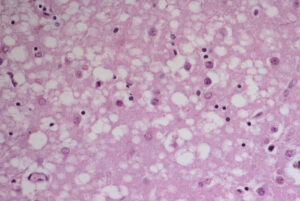Classic Creutzfeldt-Jakob disease (CJD) is a rare and fatal neurodegenerative spongiform encephalopathy caused by prions (i.e., misfolded proteins). First recognized in the early 20th century, classic CJD can be categorized as sporadic (~85% of cases), genetic (10% to 15% of cases), or iatrogenic (<1% of cases). Variant CJD is a distinct form of the disease, sometimes called “mad cow disease,” that was linked to beef products in 1992, mainly in the United Kingdom (UK). Transfusion transmission of variant CJD has been documented in four cases all prior to 2004. Since 1995, the American Red Cross (ARC) and the U.S. Centers for Disease Control and Prevention (CDC) have investigated the potential for transfusion-transmission of classic CJD in the U.S. Between 1995 and 2023, the ARC identified 84 blood donors who later were diagnosed with classic CJD (96.4% sporadic, 2.4% genetic, and 1.2% iatrogenic). These donors gave 3,284 blood components of which 1,245 were possible to follow in transfusion recipients. Based on 6,495 person-years of observation, no cases of transfusion-transmission of classic CJD were identified. Likewise, no cases were identified in the UK and Scandinavia from comparable studies in over 8,800 transfusion recipients, totaling more than 15,500 person-years. Although transfusion-transmission of classic CJD remains theoretical, lookback studies strongly suggest that the risk is very low.
Reference:

